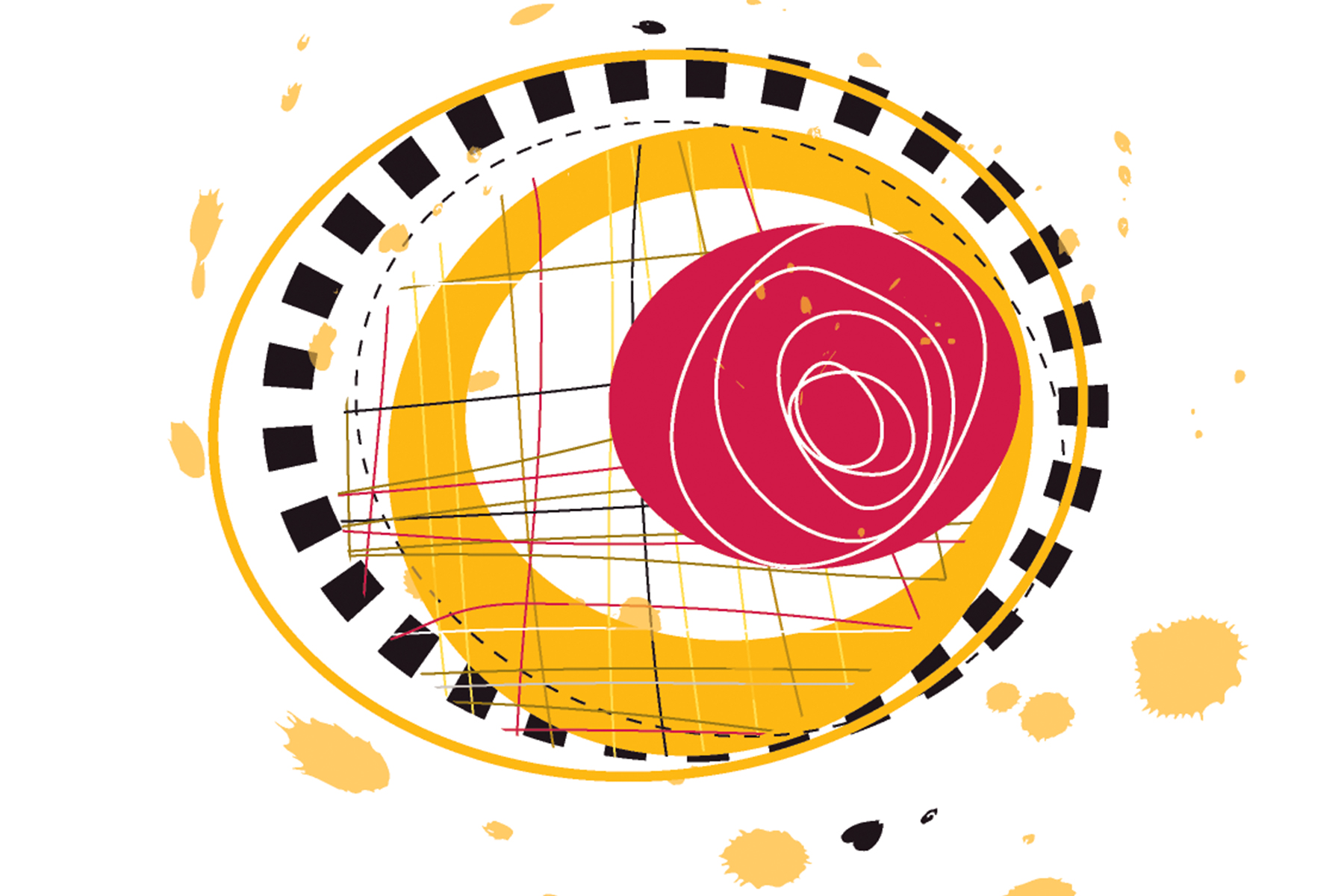
Move Away Slow
by Ben Fountain
The phone rarely rang when I was starting my second career, the career I had after the demise of my first career, when the megafirm stopped practicing law as a team sport. Most mornings I drove straight to the courthouse for jail chain, pleading out cases for a few hundred dollars a pop. It seemed not to matter that I didn’t know what I was doing. Criminal justice in this country is a blunt instrument. Of course it mattered to my “clients,” those two or three hours they were in my care, but they didn’t know enough to know all the things I didn’t know.
When the phone rang it was usually junk, or worse. Time-share salesmen. Janitorial services. My wife’s lawyer. One day I picked up and heard:
“Thad Burney. You’re alive.”
Hearing that voice produced a complex response in me, the dreadful thrill that an alcoholic might feel surveying an open bar.
“Apparently so.”
He laughed. “Apparently still an asshole, too. Where you been? I’ve been calling all over. Somebody said you’d moved to Belize.”
“I’m still here. Got an office off Cedar Springs.”
“You still lawyering?”
“I guess. I’m a courthouse lawyer now. Criminal defense.”
He thought about this. “Any money in it?”
I snorted.
“You’re not doing deals?”
“Is anybody doing deals?”
“We are. We’re picking up properties for cents on the dollar. You know what they say: ‘The time to buy is when there’s blood in the streets.’ ”
“Well, we aren’t lacking that.” I gathered myself; it seemed important not to sound like I was pleading. “You got a deal for me, Tommy?”
My first career, at the megafirm, had been in real estate finance, papering deals for developers at a time when every idiot and his monkey were making money in real estate. Tommy sailed into my life with a hurricane at his back, soon to be famous for telling the Dallas Morning News of one of his projects: “We aim to have toilets flushing within 18 months.” He drove Porsches and dated blondes who were hard to tell apart. He claimed to sleep only four or five hours a night. His favorite sport was going to Beau Nash for drinks and watching the high-dollar hookers troll for clients at the bar.
The deal was simple. He was setting up a holding company and needed a corporate officer to sign the papers. A president. The company was being formed as we spoke.
“Wait. Are you offering me a job?”
“Not a job, exactly. It’s a formality. I’ll pay you a hundred thousand bucks for your trouble.”
I swiveled my chair toward the window. It was spring, pollen season in Dallas. The glass was hazed the faint yellow of diluted pee.
“What’s this about, Tommy?”
“I told you, it’s a formality. The accountants are telling me I need a holding company. It’s a tax thing.”
“But why me?”
“Why not you? You’ve got integrity. That’s a rare commodity in this town.”
“I appreciate that. But I think I need to know a little more.”
“What you need to know is, Thad, I trust you and respect you and, frankly, I heard you needed a break. And I need to move fast on this. Like, today.”
I said nothing.
“I heard about you and Cheryl. Economy goes to shit, I guess it’s hell on a marriage.”
“It doesn’t help.”
“How’re the kids?”
“OK. Considering.”
“Look, let me do this for you. Come over, have a look at the papers, get comfortable with everything. I’ll cut you a check today.”
I laughed. That laugh was me imagining doing it, and how much damage a hundred thousand dollars might repair. Then he doubled the offer, and I began to think I could actually do this.
“Two hundred thousand, Thad. I need to move on this. Look, I’m not gonna bullshit you. I’m putting a premium on your discretion, OK? I need someone I can count on. That’s what I’m paying you for. And I can assure you, whatever I’m getting out of this little transaction of ours, you’re getting a helluva lot more than me.”
I sort of went out of my head just then, floating free for a couple of seconds, silent and free as a jellyfish drifting in the sea. I’m not stupid. I understood the nature of the bargain being offered, and even the best-lived life is bound to include some larceny. Who was I to think I was different? Arrogant. Or maybe just: scared. The economy crashed and the grand larcenists got richer than ever while the chumps were left to pick through the wreckage. This was our world, the world we’d made. As if larcenist or chump were your only choices, and count yourself lucky to have the choice.
To this day, I don’t know why I did what I did. All I can say is that fear had more to do with it than anything you’d call “integrity.” Tommy seemed irked, nothing more. “Thad,” he said briskly, “you disappoint me,” and hung up.
I saw him a few years later. I was out on a date with my wife, an honest-to-God date; I still hadn’t moved back in. I was squeezing through the crowd at the bar for drinks when someone shouted my name. I turned, and there was Tommy standing a few feet away, at the center of a scrum of happy, noisy drunks.
I think I said something like, “Hey, how are you?” Tommy cut straight to the chase. Later I would realize he was busting to tell me.
“You were smart not to sign those papers,” he shouted over the noise. “The guy who did? He’s in prison now.”
He laughed like it was the jolliest thing ever. I think I might have laughed, too, out of reflex; I don’t recall saying anything. What I do remember is hearing myself telling myself, It’s OK. You’re OK. Just move away slow.
Ben Fountain’s work has received the National Book Critics Circle Award and the PEN/Hemingway Award, among other honors. His third book, Beautiful Country Burn Again, will be published in September by Ecco/HarperCollins.

Highland Park Postcolonial
by Shay Youngblod
If I start, I have to finish. If you let me in, I might never leave. If I wake you up, you may never sleep again.
The big Texas sky was pale blue, cloudless. The summer sun relentless, beating down on a huge magnolia tree that looked as if each shiny leaf had been polished by hand. Sweat pearled on Justine’s forehead and dripped down the collar of the red cotton shift. She repeated each sentence in Spanish, Japanese, German, and Esperanto. A tiny pink bicycle was parked on the gravel drive of the sand-colored house, landscaped with a perfect carpet of emerald green grass. Posted on the lawn was a Sotheby’s sign and next to it a white hand-lettered sign that read:
3 bedroom house for Rent
$725 per month
Pets welcome
Justine stood at the front door of the three-story postcolonial in Highland Park. Waiting for the blue door to open, she was startled by a loud hum like the sound of a million bees behind her. When she looked over her left shoulder, she almost dropped the small cardboard box of ashes under her arm. She was eye to eye with a flying drone. When the door opened, she smiled. He looked like a reasonable man.
“I’d like a glass of water.”
Charles wasn’t sure he had heard her correctly. She seemed to be reciting a poem or instructions or both. When he heard the doorbell, an annoying gong that sounded like Bruce Lee was about to leap from the top of the stairs ready to fight, he wasn’t expecting anyone, certainly not the elegant woman the color of his morning coffee standing in front of him with a white suitcase in her hand. He suddenly worried she would give him a Bible and ask him to pray with her. He didn’t want to be rude, because she reminded him of Johnnie Mae from down south. Before he could come up with an excuse, she asked for a glass of water. Then he remembered the For Rent sign.
“It’s art,” Charles said, gesturing toward the sign.
“My friend Yasmin won the lottery,” Justine said and walked past him into the house. She stood taking in the huge, double-sided aquarium, the cool blue pool, and the bocce court.
Upstairs, Anja pulled her hair into a ponytail, then applied a deep red matte to her full pink lips. She almost tripped down the stairs when she saw the woman drinking from a vintage gold-rimmed crystal goblet. The woman said something about reparations, then walked up the staircase past her.
Charles and Anja followed their uninvited guest through the house as if pulled by an invisible rope.
“Her friend won the lottery,” Charles said.
“The sign is still out there?” Anja’s eyes widened.
“Yasmin is from Iran. Now she has a green card,” Justine said.
When they reached the master bedroom, Justine ran her palm over the white Egyptian cotton bedspread as if it were a pool of water. Charles and Anja watched paralyzed as she lay on the bed and took in the view of sky and trees beyond the picture window. She pulled a tiny red flag from the white suitcase and planted it in the middle of the bed.
My name is Justine.
This is my house now.
Everything in it is mine.
Pledge of Allegiance to my crown and flag.
Go to the kitchen and make me a meal.
Stew me a plate of your feet in a sweet curry sauce.
Marinate your tongue in sweet hot honey.
Say something funny.
feed me
Say it in French
nourris moi
Say it in Spanish
alimentame
Say it in Japanese
watashi o yashinau
Say it in German
fütter mich
Speak to me in tangled tongues.
I bind you to me by charm
by blood
by force of habit.
You belong to me now.
Your bathwater, the air you breathe.
Everything inside of you is mine.
I am the Queen of you.
Watch me reign.
Shay Youngblood is a Texas-based writer and artist working on a multimedia performance, installation, and book project about architecture and memory started during a residency in Japan inspired by the 2011 earthquake. She is the author of the novels Black Girl in Paris and Soul Kiss.
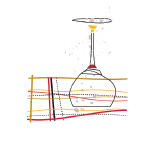
Maybelline Boy
by Julia Heaberlin
The first time Johnny asked his mom if he could play with me, she said no.
Johnny was 8 years old. White. Splotched pink with sun, humiliation, unexplained rashes.
I was 10. Black. Small, but intimidating.
We were a perfect match.
His mom was pissed when she saw us together a second time. She slapped Johnny so hard he wore some of her makeup to school the next day to cover up the bruise. His mom, still a little drunk, had suggested it.
She said no one would be able to tell. She said he’d better not tell.
Two boys shoved him into his locker and asked if he had a vagina. Called him Maybelline Boy. In the gym, they pinned him down and painted his lips bright red like a Texas whore with lipstick they had snatched from a cheerleader’s purse. They bawked like a chicken when Johnny ran.
Some games never grow old.
Johnny found me and cried for hours. He said he wished I’d been around.
Johnny wasn’t chicken enough to stop playing with me. His mother grounded him a dozen more times when she saw us together. She seemed halfhearted about it.
“Mr. Blonde,” he’d say. “We’re going to be somebody.” Mr. Blonde was just one of his nicknames for me. Superchicken, Big Daddy, Genius, Chocolate Candy, Amigo, Ms. Congeniality, Toastmaker—it was something new all the time.
His dad didn’t care what Johnny did. He had his other family to worry about now. Twin boys—two more shots to get it right. A wife with bleached hair, breasts that spilled out of her t-shirt, a hawk nose that men barely noticed. She told his dad that Johnny was a freaking weirdo she didn’t want rubbing off on their kids.
The last time Johnny saw his father was kind of a blur. His dad was gripping his mom’s throat until her breath sounded like a stuttering teakettle. He was yelling. Johnny was pressing his hands tight against his ears, but he heard what he was supposed to hear: “He’s not mine, slut! No kid of mine would strike out looking.”
Johnny stumbled from behind the couch after his dad slammed out. His mom stayed crumpled on the living room floor for a long time, sobbing, not saying a word to Johnny. She wouldn’t look him in the eye, even after he kept bringing her one thing after another.
A glass of water. A pillow. A bag of frozen peas for her throat because he heard that could help. A whole bottle of wine with the top unscrewed.
She grabbed the wine and the car keys and didn’t come back for 18 hours.
While Johnny waited for her, he had plenty of time to count the minutes. He had plenty of time to think about why his father hated him.
He had plenty of time to stare at the veins that crawled down his pale arms and legs like blue worms. He had plenty of time to vacuum and dust, to scrub at the permanent stains in the toilet, so his mother wouldn’t hate him so much, too.
Plenty of time to walk 3 miles to the laundromat off Lancaster, the one that didn’t scare him as much. He wanted to wash his only sheets, stamped with red trucks, because he’d wet the bed again that night.
His dad never came back. Never sent money or Christmas presents.
His uncle showed up, though. For years, he and Johnny would go on long car rides to the Piney Woods and secretly take me along.
We’d hang out in the middle of nowhere, shattering the silence. We were so loud sometimes, the sky cracked.
His uncle liked to think he was turning Johnny into a man. He thought I was helping.
In his bed at night, while the moon shined light on those little red trucks, that’s exactly what worried Johnny—how much of a man he was.
He never told on the bullies at school. He learned to do the minimum of what his mom asked—exactly the right amount to keep the peace.
He carefully washed his mom’s wineglass by hand every night, the only one she hadn’t pitched into a wall, and let it drain on a kitchen towel with yellow daisies.
When he made Toaster Strudels after school, he always cleaned up all the crumbs, because one single crumb could be a bomb.
When he baked a chocolate cake out of a box the day after his 13th birthday, he hid it in his room so his mother wouldn’t yell at him that she was too tired to remember everything.
That last summer, I was never far. He talked to me all the time. He turned up the volume of the video game so it drowned out his voice, just in case his mom sneaked out of work early.
He told me for the hundredth time that I was his best friend.
At 14, I was everything to him, and I wasn’t enough.
He no longer wanted me to be a secret to his mom or anyone else.
He took me into the school gym, boldly, proudly, in front of everybody. He bawked like a chicken over the screams.
Now I’m lying beside him on the gym floor, his blood all over me.
A cop is carefully picking me up.
Calling me by my name.
Glock.
Julia Heaberlin, who lives in Grapevine, is the bestselling author of four psychological thrillers set in Texas. Her latest, Paper Ghosts, was published by Penguin Random House in May.
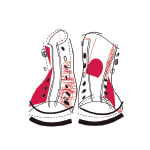
Green Oaks
by Merritt Tierce
They take your shoelaces and you eat with plastic cutlery and none of the doors lock except the ones to the outside. The door to your room doesn’t lock and the door to your bathroom doesn’t lock even though you have a roommate who hides under the covers all day, a relief for you both.
But the first 24 hours you spend in something like a dentist’s chair, in a room with 30 other people in dentist’s chairs. They give you a thin blanket that provides no warmth and does little to shut out the fluorescent light they don’t turn off. In this room you will probably keep living for 24 hours. Even if you found a way to injure yourself, staff are present and watching, would respond, and the hospital is just next door. Someone else would have to injure herself first, distracting all of the staff long enough for you to carry out your plan, and that’s probably not going to happen. What probably will happen is that someone stimming in the adjacent chair will break out of their creaking rock and mumble to grab your paper sack, your midnight lunch, weird bridge in their micro noise opera, crinkling the paper and shouting huh-FOCK while you lie facing away, ignoring it, relieved when the stimming resumes after the paper sack grab bridge because it means he’s not going to try to touch you, of which you were afraid. I don’t know why I’m saying you. I guess because I didn’t want to start They take my shoelaces. That would have seemed pathetic and it’s already so pathetic. Out in the cement night another patient did try to touch you. Did touch you. Once every four hours you can go out to smoke and there’s a water fountain. There are no benches or chairs. You know I didn’t even react. I kept drinking water from the fountain, wondering if the staff would make him stop, but they couldn’t see. I stood there thinking how flawed and useless all this is and I still think that. I thought in a complete and melodramatic sentence, to explain to everyone why I wasn’t reacting, If you think I’ll try to protect my body from you, you’d have to think I didn’t learn 10,000 times already how it isn’t mine. And that would be insulting because I’m good at school, too—but now you’re undoing what you said earlier, that you were afraid the other man would touch you. Fucking shut up. It’s a subjugated consciousness; it’s always both. In school I’m serious. Diligent. He asks for my phone number and I give it to him and he writes it down with a contraband pen. That’s how permeable I am. How porous.
Next the psych ward proper, en route to which I paused in a room and undressed and two people counted the burns, marking them in corresponding spots on a paper outline of a human form. Then the office and the resident, the afternoon sunlight shafting through the slit window, shining right into his left eye, lighting up the iris, liquid mahogany with olive dots, then flashing off his flashy watch. Huge, that watch. Silver with so many circles. He kept looking at it. He asked me two questions and diagnosed me as bipolar. Am I telling this story with blurred broad strokes, blunt offenses to make my past burned psych ward self seem more delicate? Less pathetic, more buffeted. Moth, jar. No because I don’t remember the two questions but I do remember clearly thinking, How can you diagnose me as bipolar after asking me two questions and looking at your watch? Being a good student and diligent and white and often naive, as a matter of logic and temperament and privilege I believed what people told me; a discrepancy gross enough for me to catch it so quickly thus indicated it might be real. Even I, the last to react, suspect. But I wasn’t saying much then so the words stayed inside my skull, surrounded by a fire. They Depakoted me and put me away and I thought about how to kill myself without strings or edges or a locking door. It wasn’t hard to figure out a method but I won’t tell you what it was, as that seems tacky or sensationalistic and what I perhaps need less of is sensation. If you loved me and we were in bed together, I might tell you, if you wanted to know.
You couldn’t go outside there either except to smoke, and the smoking yard was a box, a 4-by-4 patio, glass on all sides, glass two stories up. You couldn’t see any of the city or the world or anything from there except a patch of sky and the corner of the Four Forest building. You could see the jutting edge of the building and the white stripe around it and the words FOUR FOREST. It didn’t jut. It had no agency. It was just a building you could see a part of. Every time I drive past the Four Forest building, which I do once or twice a week, these 14 years, I see his watch, his mahogany afternoon eye, they count my burns, the hand behind me up my shirt, huh-FOCK, the locks don’t lock—
When someone kills their self, people say all that—that rote it’s a cry—so selfish. I don’t understand that. The fire between my brain tissue and the ceiling of my skull still burns. I wish someone would put it out. When someone kills their body all I think is that’s how hard it is to be alive.
Merritt Tierce is the author of the novel Love Me Back, which won the Texas Institute of Letters’ prize for first fiction. She currently writes for the Netflix show Orange Is the New Black.
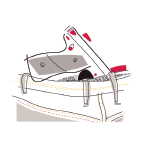
Suntan Lotion
by Harry Hunsicker
I didn’t much care for guns.
Guns led to killing, and killing opened doors that were better left shut, dark places in the back of your mind where the bad things lived, smoldering like an untended campfire waiting to flare up.
Darla pulled the pistol from the glove compartment, ran her fingers over the barrel.
I tried not to watch, paying attention to the street instead.
The smell when you shot somebody was the worst part. Copper and ammonia, sweat. Plus, the aroma of a body going from being alive to being not, a feeling as much as an odor. If I were a religious man, I’d say it was the soul departing, dried flowers and moist dirt mixed with a melancholy like when all the Christmas presents have been opened.
The VA doctor gave me some pills to make the smells go away. They made everything else go away, too, so I quit taking them.
Darla felt differently about guns and killing, especially on a big score like this one.
“A lot of money on the line,” she said. “We can’t be too careful.”
I didn’t want to make Darla mad. She smelled like carnations and shampoo and suntan lotion, pleasant odors compared to what was usually bouncing around in my head.
But I didn’t want to touch the gun either, no matter how pretty she smelled.
The dark steel reeked of sin—black and cold, oily.
“It’s just for show.” She stroked my thigh. “You don’t gotta use it.”
Her fingers on my jeans made the smell of suntan lotion stronger, for some reason reminding me of that old commercial from when I was a kid. Bain de Soleil for the St-Tropez tan. I liked that commercial.
I slid the pistol into my waistband, breathing through my mouth.
As soon as the metal touched my flesh, images of the last man I’d shot flooded my memory. A teenager in a dirty tracksuit, waving an AK-47. Fallujah, a lifetime ago. Suntan lotion gave way to the stench of diesel and rotting garbage, unwashed bodies and spent gunpowder.
Darla and I were parked in front of the Rodriguez Brothers Funeral Home on Jefferson Boulevard, an area that was transitioning from regular people to hipster asshats. The funeral home sat between a botanica filled with herbs and Santa Muerte statues, and a shop that advertised freshly ground artisanal coffee.
A guy Darla knew, Parnell, worked as an embalmer at the funeral home. He also wholesaled dope out of the back room, which was where the big score came into play. Darla figured he had upwards of $10,000 on him, enough to tide us over for a while.
We exited the vehicle, jogged across the street.
An old woman stepped out of the botanica and the cloying stink of the place overwhelmed me. My head felt dizzy. My eyes watered. Spices and oils and scented candles.
“You OK?” Darla stared at me.
I swallowed the nausea and nodded.
Darla smelled different, the salty edge of fear wafting off her skin.
“We don’t have to do this,” I said.
“We need the money.” She headed to the funeral home.
I followed because I had nowhere else to go.
The back room was filled with bottles of embalming fluid. A sheet-covered body lay on a marble table, a tube full of Lord-knows-what snaking downward to a drain.
I couldn’t smell any of that. All I got was Parnell. Chewing tobacco and Old Spice, malt liquor.
“Give me the money,” Darla said. “All of it.”
Parnell pointed to me. “Who’s he?”
The smell of warm ashes filled the room.
“What’s burning in here?” I asked.
They both looked at me, quizzical expressions on their faces.
Parnell cocked his head. “What the hell are you talking about?”
“His nose doesn’t work right,” Darla said. “He got all messed up in the Army. Let’s get back to the money.”
“He don’t look right either.” Parnell peered at my face. “Like the lights are on but nobody’s home.”
Anger filled my mind. Cinnamon and burlap, a strange combination but one I knew all too well.
“What did you say?” I pulled the pistol out.
The smell of the steel was comforting now. An old friend.
“T-t-take the money.” Parnell’s teeth chattered. He pointed to a gym bag on the counter.
Darla let out a whoop and grabbed the bag.
I aimed at Parnell’s face. “What do you mean, ‘I don’t look right’? You saying I’m crazy?”
Smoke that only I could see filled the room like haze from a forest fire.
Parnell’s face was white. “P-please, mister. Don’t hurt me.”
The smoke grew thicker. I smelled hot coals and burning wood. Singed hair.
Darla appeared in the haze, bag over her shoulder. “Put the gun down, baby. We got what we wanted.”
I smelled the hospital, rubbing alcohol and the mustiness of the canvas on the restraint jacket. Everything fell in on itself. The gun grew hot.
Darla screamed.
In the car. I riffled through the cash, sniffing.
The money had no smell.
“I don’t like guns. Tried to tell you that.” I put the money back in the bag.
No reply.
“I’m sorry.” I rubbed my eyes, trying not to cry.
Across the street, people from the coffee shop were milling around the front of the funeral home. One of them pointed to the vehicle where I was sitting alone.
“We got a big score.” I tried to smile. “We’re set for a while.”
Sirens in the distance. I pulled away from the curb.
I drove down Jefferson, wishing I could smell the suntan lotion again. 4
Harry Hunsicker is the former executive vice president of the Mystery Writers of America and the author of seven crime thrillers. He is a fourth-generation native of Dallas, and his fiction has been shortlisted for both the Shamus and Thriller Awards.
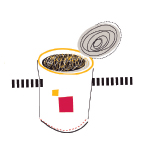
Neighborhood Dog
by Samantha Mabry
Riding bikes together on the Santa Fe Trail had been Joey’s idea, and Katherine went along with it, thinking she’d have an OK time. She and Joey had known each other for a while—they graduated the same year, shared a major—and had recently reconnected through a friend of a friend who knew they were both single and liked biking.
They met at the edge of Exposition Park and headed out toward the lake. Katherine first saw the dog on a stretch of trail somewhere off Grand. It looked like it was maybe a Lab mix. It had on a faded blue collar and tags. It wasn’t limping or lean, and its golden fur shone in the sun as it trotted parallel to the trail. At one point, a butterfly flew past, and the animal lifted its snout to nip at it.
“It’s just some neighborhood dog,” Joey called out over his shoulder. “I live close by here. I see it all the time.”
The dog veered off between two houses and disappeared. Katherine thought it had to have belonged to someone or else it wouldn’t have been wearing tags. Still, it was supposed to rain that night, and Katherine was worried. She didn’t have any pets, but she liked dogs despite the fact that when she was 6 or 7, a friend’s German shepherd had bitten her on the face. She’d needed 10 stitches. She still had the ghost of a scar running across her right cheekbone.
Even before the ride was over, Katherine knew that this would be her and Joey’s only date. It was basically going fine. The two of them had things in common. Joey was nice and had made her laugh a couple of times, but Katherine was going through a phase in her life in which she was happy being alone. She enjoyed the predictable rhythm of her days.
Late the next afternoon, after it had rained all the previous night and much of the morning, Katherine went out and bought some dog food. The sun was starting to set as she then rode her bike toward the lake again, and after a while she spotted the dog not on the trail, but trotting down an empty side street.
“Hey!” she called out, steering her bike into the wet grass. “Hey, pup!”
The dog stopped. Katherine braked and dismounted. She took a can of food from her bike bag, popped open the tab, and walked over to dump out the contents in the middle of the closest sidewalk. After stepping back a bit, Katherine watched the dog come up and sniff at the food. The dog looked up at her, wagged its tail, and then started eating.
“Hello, there,” Katherine said with a smile. She approached the dog slowly. Its paws were muddy, and its fur was a little damp. Aside from that, it seemed happy and clean.
Katherine took another step forward. “Hello. Hello, sweet pup.”
Eventually, Katherine got close enough to hold out her hand in an effort to reach for its tags. That’s when the dog snapped. Its teeth dug into Katherine’s index and middle fingers before she was able to pull away and smack the animal on its snout. Unfazed, the dog went back to eating its food, and Katherine backed away, cradling her throbbing hand to her chest.
“Bad!” Katherine choked on a sob and surveyed the empty street. It was a residential neighborhood, but there didn’t seem to be anyone in sight. Didn’t Joey say he lived around here?
The dog looked up from the remains of its food and growled—then it barked. Then it kept barking at Katherine in deep, angry booms as if she were the one who did something wrong. The dog didn’t charge toward Katherine, but made little lunging leaps, forward and back.
Katherine didn’t want to look at her hand because it hurt like hell and she was sure it was bleeding. The porch lights of the houses in the neighborhood started to click on, and Katherine realized that, by the time she biked home, it would be dark. She wondered again if Joey was close. Maybe if she shouted his name, he would hear her and come out to help. Maybe she’d been too quick to judge him. His number was still in her phone.
The dog was still barking and lunging as Katherine stepped back and reached with her good hand, blindly, for the flap of her bag. Her thumb accidentally grazed the bell. It let out the softest ring.
Samantha Mabry was born and raised in Dallas. She is the author of the young adult novels A Fierce and Subtle Poison and All the Wind in the World, the latter of which was nominated for a National Book Award in 2017.

Home
by Brooks Egerton
Were you a particularly regular and observant customer of a certain 24-hour cafe on Central, you might have noticed an elderly Econoline van in the back lot. Sandwiched between a cottonwood and a trio of dumpsters every weekend night, all night, for many months. Bent Tennessee plate, no windows on the sides, cardboard covering the ones in the rear. Inside it on this frigid particular Sunday, a 95-pound motel maid named Evelyn burrows in a down-filled sleeping bag that she got in Chattanooga, at an Army surplus store where her husband used to buy little brown bottles of iodine crystals. By the case. They were marketed to backpackers for water purification, but the bulk buyers were all cooks of a certain stripe.
“Charlie was a meth major in college,” Evelyn has imagined joking on some distant day when her cheeks are a bit less hollow and humor is possible again. For now, though, she snuggles cheek by jowl with a Rottweiler named Tinker Bell, also 95 pounds, and dreams of an insatiable forest fire. The disposable phone she bought when reaching Dallas last year begins to ring, which her brain interprets first as an alarm that firefighters mock and then as a tremolo duet of loons.
Evelyn wakes with a jolt, which stirs the dog into a spasm of barking. No one is supposed to know how to call her except her daughter. She does not recognize the incoming number. Charlie and his cop buddies have tracked her down at last, she fears, but she answers anyway, thinking to throw them off the trail with a British accent she’s been practicing.
“Glory, hallelujah, Mama,” says the young woman on the other end of the line. “He finally OD’d!” She’s calling from the medical examiner’s office, having just identified her father’s body, and soon is racing along with the rest of the story: how Charlie bonded out of jail for the 33rd time and promptly peeled the roof off his trailer, trying to bolster another government conspiracy theory; how he crawled into a stranger’s unlocked car outside a Walmart and died with a needle in his neck.
“I’m on my way,” Evelyn says. She takes Tinker Bell out for a quick farewell pee, then enters the cafe just before midnight, orders takeout for two, and heads to the bathroom herself. Fifteen minutes later they are barreling past skyscrapers and banking onto I-30.
As the dark miles blow by, Evelyn imagines all she’ll be surrendering: a job with free showers and free weeknight parking for this little four-wheeled room of her own. Free food occasionally left behind in the kitchenette units. And no commute. She turns around at the first Texarkana exit. She will be stripping beds by dawn.
Brooks Egerton used to be an investigative reporter at the Dallas Morning News. Now he’s working on creative writing projects.
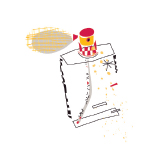
Night Lily
by Kathleen Kent
A young Asian woman has come out of the massage parlor, smoking a cigarette, the strap of a yellow purse over one arm. She’s small, standing slightly pigeon-toed in the manner of a self-conscious child, looking in our direction. She looks underage, but she puffs away expertly, peering anxiously from time to time over her shoulder, back toward the parlor. The shades at the windows are always down, but I know that she knows that she’s being watched.
My partner, Dan, is talking about the Super Bowl in a dispirited way that tells me he really didn’t care about either team. They weren’t the Cowboys, so its main value was in the halftime entertainment and the overblown commercials. My vice partner for two years, he knows not to talk politics with me so his fallback position is usually sports. We’ve been at this surveillance point in front of the massage parlor, collectively, for 20 hours, so I’ve heard more football stats than I ever hope to hear for the next 10 years.
As he’s talking, I sit up straighter in my seat because the girl is making her way straight for us, holding her bag tightly in front of her stomach. She’s wearing a sleeveless blouse, a short pleated skirt, and open-back silk slippers that snick softly against her heels as she walks. The kind of slippers sold in five-dollar stores, and not meant for walking any distance, but rather for shuffling around an apartment. Or around the confines of a massage parlor, because, after all, where are the girls going to go but from the receiving room to their tiny cubicles to service their customers, and then back again?
She picks up her pace and an older Chinese woman comes out of the parlor and onto the sidewalk. Mrs. Chu, the manager and part-owner of the operation. A day-to-day overseer of the working girls—most of them Chinese, but a few of them Thai—she makes sure they have food, clothing, and medical care. For all that, she’s closer to a prison guard than a den mother, holding ransom in a safe whatever passports or pieces of personal identification the girls do possess, locking them in the building at night.
Our nickname for her is Mama. Short and fat, used to an abundant diet of sticky rice and force-fed ducklings, she has the beaming face of a cherub when being watched by outsiders. But I’d seen surveillance footage of her viciously slapping one of her sex workers in front of a prospective client, knocking the woman to the floor of the salon and then kicking her. The woman had pulled herself into a tight, defensive ball, trying to protect her face and head with her arms, when Mama finished the lesson by dropping a heavy tray on top of her.
Mama calls to the girl approaching us, but the girl only walks faster and when she gets to our car, she raps quickly on the glass with her knuckles. The madam’s voice gets louder with alarm and Mama makes a beeline for her. The rapping gets more insistent and I roll down the window. I see now that she’s young, maybe 15, 16, and her eyes, tender and vulnerable-looking with no makeup, are wide and unblinking. She tosses into my lap a small card, flicking it from her fingers in one expert motion.
She moves backward, away from the car, as Mama, clearly angry, puts her arms around the girl and begins to steer her back to the parlor. The arm gesture is supposed to appear caring, a mother leading a toddler gone astray, and the old lady nods to us, grinning, as if to impart, “Just a misunderstanding.”
“OK … OK,” Mama says to us, bobbing, bobbing her head.
I expect the girl to show some signs of resistance as the old woman spits a continuous stream of warnings, or threats, into her ear. But her body goes slack with resignation and she lets herself be led away.
I start to get out of the car and Dan grabs my arm, saying, “Hey, Connie, no, don’t do it …” As undercovers, we’ve been made. But the mandate is clear. No contact, for any reason, until an arrest warrant is served.
As they step up onto the sidewalk, the girl reaches one hand behind her, resting it at the small of her back, palm outward, fingers splayed. And then she closes her fingers tightly into a ball. Not as a symbol of a fist in defiance, but the universal gesture of a prisoner.
The door to the shop closes and I look at Dan and then down at my lap, to the card the girl has tossed to me. It’s a business card belonging to a Dallas police sergeant, narcotics division.
I show it to Dan and he says, “Oh, shit.”
Two weeks later, in the trunk of an abandoned car left in a Walmart shopping center, two patrol officers find the body of the girl. An autopsy reveals that she’d been beaten and placed into the trunk while still alive. The only item found with her is her cheap plastic handbag, yellow with purple flowers. Behind the lining of the bag are hidden more business cards, stolen from wallets that had been tucked into the pants of the johns who had paid for an hour of sex with her: an assistant DA, a prominent criminal attorney, a banker, two investment advisers, and a well-known commercial builder.
There is no scrap of paper, no bit of ID to indicate who the girl had been: her age, her origins, or even her name. The only other item found in the handbag is a bottle of cologne—Night Lily.
Kathleen Kent’s fourth book, The Dime, is an Edgar-nominated contemporary crime novel set in Dallas. She is also the author of three New York Times bestselling and award-winning historical novels. She lives in Dallas.

Peaches
by Will Clarke
I’ve been posting pictures of Peaches all over East Dallas. Peaches is my next-door neighbor Naomi’s orange tabby, and we are trying to find someone to adopt him so Naomi can move into a nursing home. Seriously, you would love Peaches. He’s a big, fat love ball.
Sadly, I’m sort of allergic to cats or else I would take him myself. Also toxoplasmosis. Most likely causes schizophrenia, and who wants that? So no cats for me. Only dogs. But now that I am touring with The Polyphonic Spree, I can’t have a dog, either. And if my solo career takes off like it did for Annie, then maybe never. God, that would be great. Can you imagine? A pet-free, kid-free lifestyle (note to self: pick up condoms) is probably the plan for a while, maybe forever. With that said, I don’t even like cats and I love Peaches—from a distance of course.
He’s just so regal. The little guy likes to get on the gables of my roof and watch the sun go down over the lake. He does this almost every evening. It’s become our ritual. I drink a couple of Shiner Redbirds and we both watch the sun fall. It’s very sweet. And somewhat mysterious. Almost magical at times. After the sun sets, I like to stand in the dark, look up at the stars, and ponder why pharaohs liked cats so much.
Anyway, Naomi’s son, Vernon, who is 72 years old, diabetic, and not nearly as with it as Naomi, just walks in without even knocking. I’m practicing my French horn, and here Vernon is, in my living room holding Peaches like a baby.
“You got to help me,” Vernon says. “Mama fell again. Got 12 staples.”
So what was I supposed to do? Tell Vernon to grow up? He’s older than my dad. Who’s the adult here? Me? So I remind Vernon how allergic I am to cat dander and I walk them both out to my driveway. I snap a few pictures of Peaches with my iPhone and I make the flyers. And now I am posting them all around White Rock. Not that hard, Vernon. Not that hard.
How Naomi and Vernon are even related is beyond me. He’s so useless while Naomi is just so industrious and capable and funny. She’s stubborn, too. That’s why I have to get a little blunt with her. So I yell at Naomi this morning that with her dizzy spells and those staples in her head, if she breaks a hip alone in that house, she is going to wish that she had just moved into the flipping nursing home.
“Don’t you threaten me!” she says, but I’m not threatening, I’m just saying. With my luck, I’d be the one to find you, Naomi. And that would eff me up forever.
Back in the day, before she started to go downhill, Naomi would make me lemon bars, and I would cut her grass when it was too hot for her to do it herself. Usually in August. We’d compare notes on our neighbors across the street, the Bundaleers. They hung Confederate flags in their windows and parked their minivan in their front yard. And they always put their broken baby chairs and tree branches out on the curb a week before big trash pickup.
“Nasty asses. I’m turning them in,” Naomi would say when she’d bring me her copy of the Dallas Morning News with a fresh batch of lemon bars. I’d play Naomi my French horn, and she and I would drink Redbirds into the night while solving all the world’s problems and trying to coax Peaches down from my roof.
I’ve written a concept album about our friendship. It’s called Your People Are My People. Do you get the biblical allusion to Naomi and the Book of Ruth? Annie thinks it’s too on the nose. I’m not sold on it, either. If I had to pitch the concept to a record label, I would say it’s kind of like a Sufjan Stevens album, but perhaps sadder, and with vocals closer to The National (I’m a deep baritone). I hear it with Moog synths combined with this angry-as-a-swarm-of-bees saxophone. I really think this album could be it for me. Annie does, too.
So when this little girl and her mom knock on my door today because they’ve seen my posters at the Casa Linda Starbucks, I thought we’d actually gotten somewhere. I thought I could finally get this album done.
“Do you have his shot records?” the mom says to me without even saying hello. She waves the flyer in my face.
“Shot records?”
“Yeah. Feline leukemia. Rabies. His vaccinations.”
“My neighbor’s on a fixed income. Peaches doesn’t go to a vet. He’s a cat.”
“Oh. OK. I’ll just take him myself.” She sort of smiles, sort of grimaces. Either way her teeth are too white. “You mind helping us put him in the box?” The mom gestures to her daughter who is holding a cardboard cat carrier. I see images of this kid forcing Peaches into doll clothes. Cruel tea parties and bathtubs full of suds await this cat—a beast who loves the freedom of the pink sky and night air. I think of Naomi alone in a nursing home. I actually start to choke up.
“Peaches isn’t for sale,” I say. “He’s mine.”
“For sale? Sign says you’re giving him away.”
“Not anymore.” I shut the door on the mother and her daughter. I practice “Light and Day” on my horn, and then google “toxoplasmosis.”
Will Clarke holds an MFA in creative writing from the University of British Columbia and lives in East Dallas with his wife and family. He is the author of several works of fiction, including The Neon Palm of Madame Melançon, Lord Vishnu’s Love Handles, and The Worthy: A Ghost’s Story.


